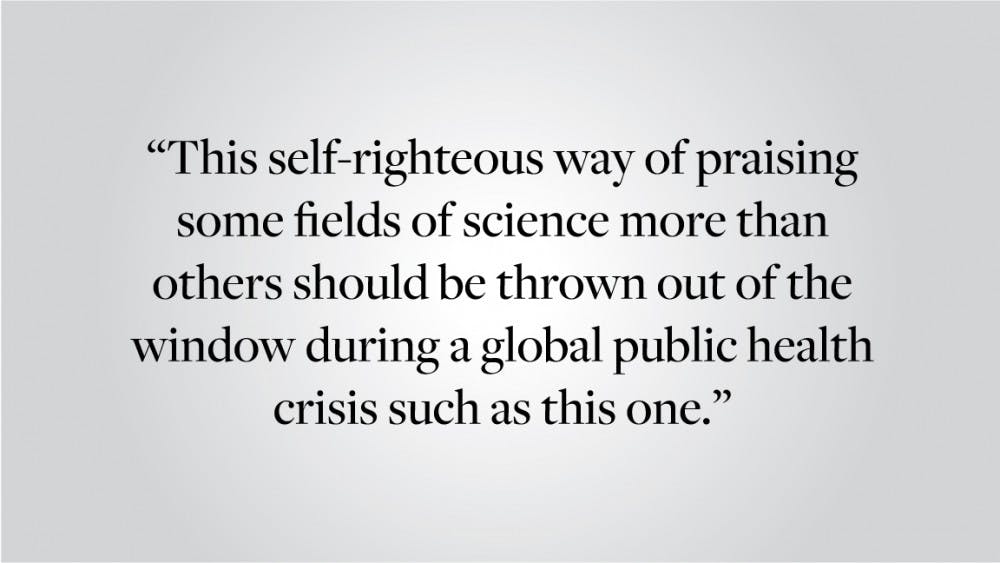At the forefront of everyone’s minds right now is the ever-developing COVID-19 pandemic. What started as a faraway problem in January in some people’s minds has shaped up to be a global health crisis with both immediate and long-term consequences. Now more than ever, the necessity of healthcare workers and clinical scientists is painfully evident.
While scientists that are on the frontline to combat the novel coronavirus may seem specialized in clinical and medical science, this is a time when collaboration within the science community is more important than ever. Elitism pervades every industry and field of study, and in the sciences, some have deemed medicine and biotechnology as worthy and valid, while other fields like zoology and ecology are seen as not as useful to everyday life. This self-righteous way of praising some fields of science more than others should be thrown out of the window during a global public health crisis such as this one. Fields like ecology, environmental science, evolutionary biology and other model-based sciences are all especially relevant for well-rounded responses to emergencies such as coronavirus.
There is a flawed concept known as the “soft sciences,” which consist of the “easier” branches of science such as ecology, environmental science and evolutionary biology. Scientific progress in these fields is seemingly slower than others. While we are learning more about the mechanisms of insulin signaling every day, the fields of ecology and evolutionary biology do not seem to make similar advancements.
The false notion of “soft sciences” may also stem from personal bias. As humans, we might pay more attention to developments in medical science since they more directly benefit us. The field of medicine seems more tangible and immediately relevant to our daily lives than, for example, population modeling or ecosystem dynamics.
During this unprecedented time, more people in the general public are exposing themselves to scientific principles. For example, many now know how washing hands can break down the lipid coating that viral DNA is packed into as well as what “viral load” is. Additionally, this crisis has highlighted the importance of citizen science, or the participation of non-scientists in scientific research and study. A University of California at San Francisco initiative, dubbed COVID-19 Citizen Science, allows anyone with a smartphone to download an app and log daily habits and health practices in an effort to record and better understand the spread of the novel coronavirus. While this is exciting for the science community — getting people to understand science and why it is relevant is not an easy task — it can be easy to overlook other non-medical areas of science.
In the midst of this crisis, the need for more scientists in ecology, evolutionary biology, and model-based sciences is more dire than ever. Ecology and environmental sciences are also relevant now. Our failure to protect our environment and the organisms within it has led to many a zoonotic disease outbreak before — think of the HIV/AIDS epidemic, SARS and Ebola. Disease ecology is its own subdiscipline of ecology that specifically studies the relationship between host and pathogen, and how disease can progress and significantly alter human populations. Researchers in these fields are informing us of the likelihood that a pandemic will happen again and tracking when and how the virus mutates into different strains.
Equally important to combating this pandemic is disease-modeling. Right now, researchers are modeling the coronavirus’ spread and making projections about the speed, magnitude and impact of the outbreak which is accelerating in the U.S. To advise state and local governments on best practices for social distancing, models must be drafted that compare the spread of the disease with and without taking the necessary precautions. These researchers are also preventing those in power who are uneducated in the sciences from making extremely uninformed and dangerous decisions. Had President Trump not been advised to extend social distancing measures until April 30, or had U.K. Prime Minister Boris Johnson been allowed to let the virus “run its course” so that the population could incur herd immunity against it, many more lives would be in jeopardy, and the healthcare system would be in even worse shape.
Unfortunately, some within the science bubble may look down upon these sciences as being less important than medical research. Ecologists and environmental scientists do not earn as high of a salary as, for example, a researcher at a biopharmaceutical company, and this may prompt students considering ecology-evolutionary sciences to instead choose a career in a more profitable field of science. Consequently, this leads to a shortage of biologists working on modeling populations and studying disease transmission, which are both efforts that can save countless lives.
Now is not the time to discredit ecology-evolutionary, environmental, and disease-modeling sciences as “soft.” The work these scientists do is informing the general public on how to slow the transmission of this never-before-seen disease and buy time until we can create a vaccine for it. Their work is not easy; just like the healthcare workers and doctors battling the virus head-on, these researchers have thousands, or potentially millions, of lives at stake if they make mistakes. They may not be dealing with coronavirus patients directly, but they work behind the scenes to inform governments on what to do to save more lives and prevent the healthcare system from being overloaded. In January, infectious disease experts warned that the novel coronavirus could spread steadily across the globe if swift action was not taken to combat the disease. Obviously, when those in power do not listen to these scientists, there are severe consequences. The work that these researchers do will be relevant to all of us as we self-isolate, socially distance and take other precautions to battle this pandemic for many more months to come.
Rachael Schmidt ’21 can be reached at rachael_schmidt@brown.edu. Please send responses to this opinion to letters@browndailyherald.com and op-eds to opinions@browndailyherald.com.

ADVERTISEMENT


